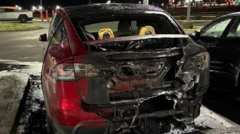Investigations reveal that the Izaguirre ranch in Jalisco state was a recruitment and training ground for the Jalisco New Generation Cartel but lacked any conclusive evidence of human cremations, according to Mexico's top prosecutor.
No Evidence of Human Cremation at Alleged Extermination Ranch in Mexico

No Evidence of Human Cremation at Alleged Extermination Ranch in Mexico
Mexican Attorney General dismisses cremation claims linked to ranch used by a powerful drug cartel, clarifying the site’s purpose.
Mexico's Attorney General Alejandro Gertz announced significant findings regarding an abandoned ranch labeled as an “extermination camp” by organizations searching for missing individuals. The Izaguirre ranch in the Teuchitlán area had sparked considerable controversy after the discovery of personal items and burned remains, leading many to believe it was a site for human cremations. At a press briefing, Gertz indicated that authorities found it had primarily served as a recruitment and training ground for the Jalisco New Generation Cartel, one of Mexico's most notorious criminal organizations.
However, Gertz made clear that investigations found “not a single piece of evidence” supporting claims of cremations occurring on the property. Preliminary analyses conducted by a Mexican university revealed that the heat levels at the site did not exceed 200 degrees Celsius, while proper cremation requires temperatures above 800 degrees. Earlier, there had been suggestions from officials that some human remains discovered might have presented signs akin to cremation, but Gertz's statements represented a clear pivot from that narrative.
Compounding this skepticism, Mexico's security minister Omar García Harfuch previously indicated that testimony from a detained cartel member had detailed extreme measures taken by the organization, including killing individuals who resisted training or attempted to flee. The lack of solid evidence surrounding the claims of systematic cremations in the area has triggered discussions and concerns about the accuracy of the initial assertions made by the victims' relatives and advocacy groups.






















